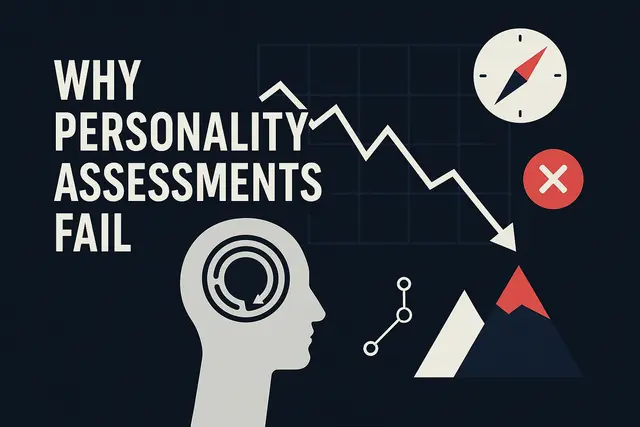Why personality tests fail without values alignment and purpose discovery
Your team took the assessment. Nothing changed.
They learned their personality type. Maybe discussed it over lunch. Then everyone went back to work exactly as before.
You’re not alone. Despite 40 million assessments sold annually, most organizations never bridge the gap between personality insights and actual transformation.
The problem isn’t the assessment. It’s what happens after.
Key insight: The gap between personality assessment and transformation isn’t a knowledge problem. It’s an implementation problem.
Why Personality Assessments Fail
Personality assessments create self-awareness. That’s valuable. But self-awareness without self-management is just expensive self-knowledge.
You know someone’s communication style. Great. Do you know their core values? Their calling? Their purpose?
Most organizations stop at personality. They measure traits, categorize preferences, and call it development. But personality is just the starting point.
The real transformation happens when personality insights connect to values alignment and purpose discovery.
Connecting Personality to Values and Purpose
What’s missing from most personality assessments?
The pathway from knowing yourself to becoming yourself.
Organizations treat personality as the destination. It’s actually the foundation. When you understand your natural preferences, you gain the ability to make intentional decisions. But those decisions need direction.
That direction comes from values and purpose.
Research shows employees who feel aligned with organizational values are 9x more committed to their roles. Not 9% more. Nine times more committed to their work.
But you can’t align with values you haven’t clarified. And you can’t discover purpose through personality alone.
From Awareness to Mastery
How do you close the transformational gap?
The framework has three stages:
- Self-awareness: Understanding who you are (your natural style, preferences, and wiring)
- Self-management: Honoring your wiring while adapting to what situations require
- Self-mastery: Aligning personality, values, and purpose for sustained performance
Evidence: When these three elements align, organizations see 64% higher fulfillment and mission-driven performance becomes natural.
Developing the Whole Person
Why holistic development matters:
Most development programs fragment people. Personality over here. Values over there. Purpose somewhere else entirely.
But you’re not fragmented. You’re integrated. Your personality expresses your values in pursuit of your purpose.
When organizations develop the whole person holistically, everything shifts. Leadership development becomes more effective. Teams don’t just understand each other’s communication styles. They understand each other’s callings.
That changes everything.
What This Means for You
Questions to ask if you’re responsible for people development:
- Are we stopping at personality assessments, or connecting insights to purpose?
- Do our tools help people discover their calling, not just their communication style?
- Are we creating self-awareness that leads to self-management and self-mastery?
The assessment was never supposed to be the finish line. It’s the starting point for a deeper journey into professional development.
Self-awareness opens the door. Self-management walks through it. Self-mastery lives on the other side.
Your team took the assessment. Now help them discover why they’re here.

